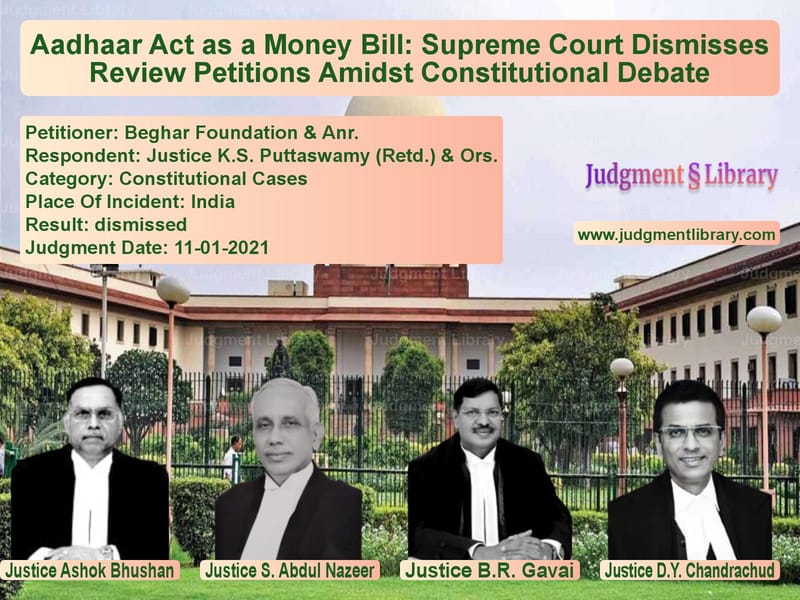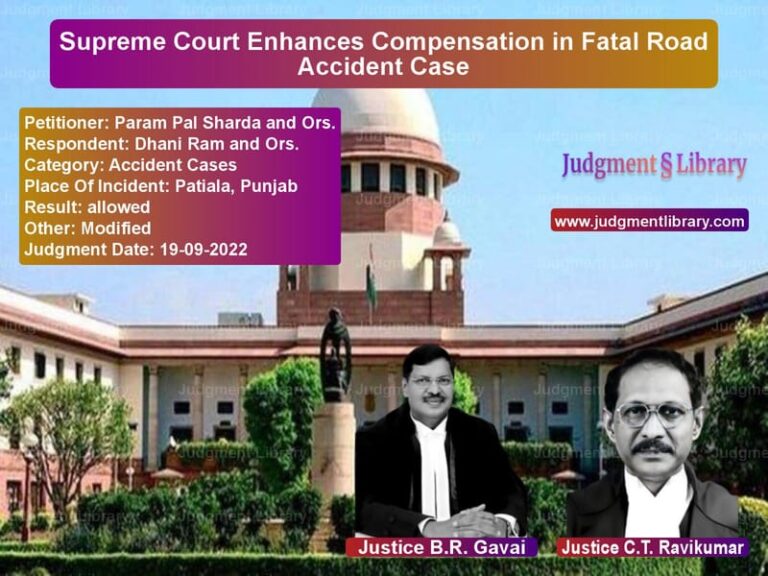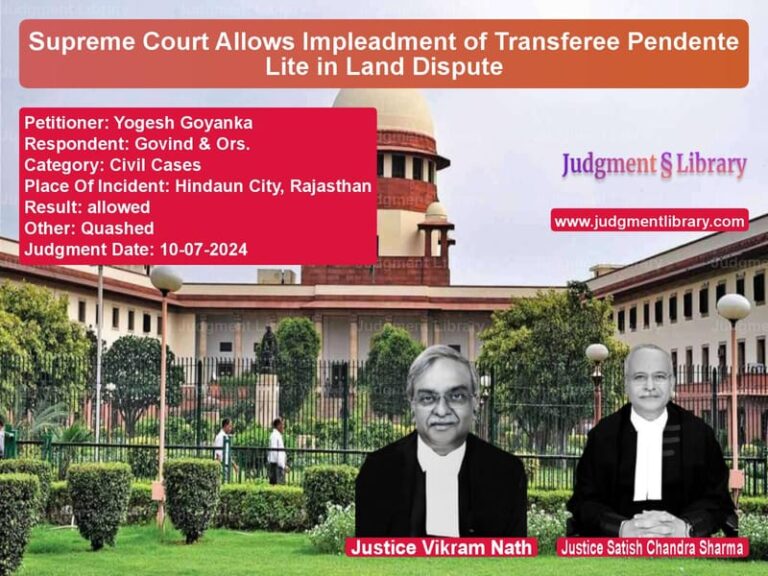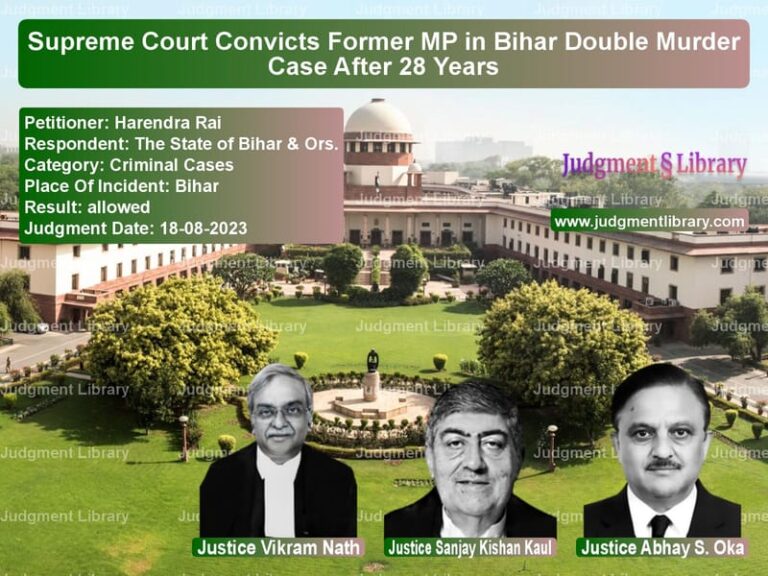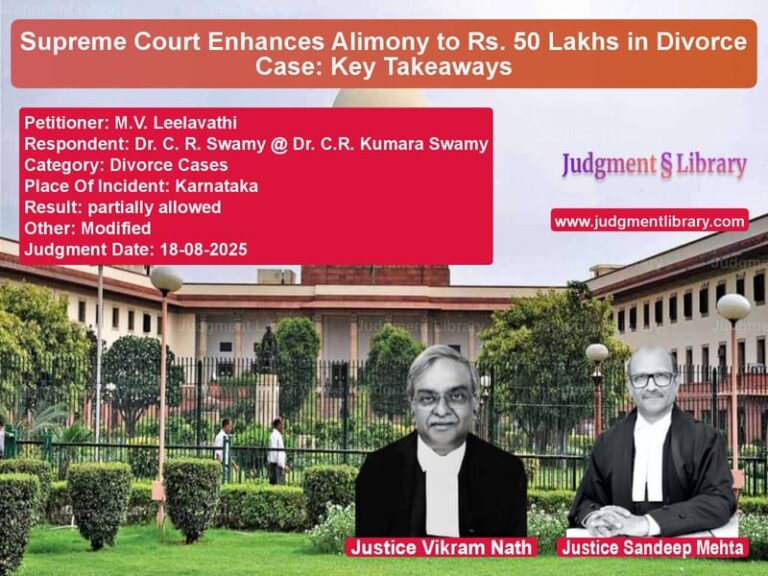Aadhaar Act as a Money Bill: Supreme Court Dismisses Review Petitions Amidst Constitutional Debate
The Supreme Court of India recently delivered its decision on a series of review petitions challenging the 2018 judgment in the landmark Puttaswamy (Aadhaar-5J.) v. Union of India case. The case centered around the Aadhaar (Targeted Delivery of Financial and Other Subsidies, Benefits and Services) Act, 2016, particularly the question of whether it was correctly classified as a ‘Money Bill’ under Article 110 of the Constitution.
The review petitions were filed by several individuals and organizations, including Beghar Foundation, Jairam Ramesh, M.G. Devasahayam, Mathew Thomas, and others. The key legal question before the Court was whether the Speaker’s certification of the Aadhaar Act as a Money Bill could be subjected to judicial review and whether the classification was constitutionally valid.
Background of the Case
The Aadhaar Act was passed by the Lok Sabha as a Money Bill, which meant that it bypassed the Rajya Sabha’s scrutiny. A Money Bill, as defined under Article 110 of the Indian Constitution, pertains only to financial matters such as taxation, borrowing, or expenditure from the Consolidated Fund of India. In 2018, a five-judge Constitution Bench upheld the Act’s validity, ruling that it was correctly classified as a Money Bill.
Read also: https://judgmentlibrary.com/maharashtras-gond-gowari-tribe-dispute-supreme-courts-landmark-verdict/
However, dissenting opinions within the original judgment and subsequent developments in another case, Rojer Mathew v. South Indian Bank Ltd., raised questions about the correctness of the 2018 ruling. The petitioners sought a review, arguing that the classification of the Aadhaar Act as a Money Bill was flawed and needed reconsideration.
Petitioners’ Arguments
The petitioners contended that the Aadhaar Act contained several provisions unrelated to financial matters, making its classification as a Money Bill unconstitutional. They presented the following arguments:
- The Act extended beyond financial matters, covering aspects such as national security, data privacy, and regulatory measures, which do not fall under Article 110’s definition of a Money Bill.
- The Speaker’s decision to certify the bill as a Money Bill was not final and was subject to judicial review.
- The 2018 judgment improperly expanded the scope of what constitutes a Money Bill, setting a dangerous precedent for bypassing the Rajya Sabha.
- The review should be kept pending as a larger bench was already considering similar questions in the Rojer Mathew case.
Respondents’ Arguments
The Union of India defended the classification of the Aadhaar Act as a Money Bill, arguing that:
- The Act’s core provision, Section 7, dealt with the expenditure from the Consolidated Fund of India, fulfilling the requirements of a Money Bill.
- The Speaker’s certification was an internal parliamentary matter and could not be subjected to judicial review.
- The 2018 ruling had already settled the issue, and a mere change in legal interpretation by a later bench did not warrant a review.
Supreme Court’s Consideration
The Supreme Court, in a 4:1 majority decision, dismissed the review petitions, holding that there was no valid ground for reconsidering the 2018 ruling. The Court emphasized:
“We hasten to add that change in the law or subsequent decision/judgment of a coordinate or larger Bench by itself cannot be regarded as a ground for review.”
The majority judgment, delivered by Justices A.M. Khanwilkar, Ashok Bhushan, S. Abdul Nazeer, and B.R. Gavai, maintained that there was no error apparent in the 2018 decision that would justify a review.
Dissenting Opinion by Justice D.Y. Chandrachud
Justice D.Y. Chandrachud dissented, arguing that the review petitions should have been kept pending until the larger bench in Rojer Mathew decided on the issue of Money Bills. He observed:
“Dismissing the present batch of review petitions at this stage – a course of action adopted by the majority – would place a seal of finality on the issues in the present case, without the Court having the benefit of the larger bench’s consideration of the very issues which arise before us.”
Justice Chandrachud emphasized that the Speaker’s decision under Article 110 could not be beyond judicial scrutiny and that the Aadhaar Act’s classification as a Money Bill remained a contentious issue that warranted a fresh review.
Impact of the Judgment
The ruling has significant implications for the parliamentary process and the scope of judicial review. Key takeaways from the decision include:
- The Supreme Court reaffirmed its stance that the Speaker’s certification of a Money Bill, while subject to limited judicial review, could not be easily overturned.
- The dismissal of the review petitions solidifies the precedent set by the 2018 judgment, potentially allowing other laws to be passed as Money Bills.
- The dissenting opinion by Justice Chandrachud signals ongoing constitutional debate, with the Rojer Mathew case likely to provide further clarity on the issue.
Conclusion
While the Supreme Court has dismissed the review petitions, the controversy over the Aadhaar Act’s classification as a Money Bill is far from over. The matter remains under consideration by a larger bench, and its final ruling could have profound implications for legislative procedures in India.
The judgment highlights the complexities of constitutional interpretation and the challenges of balancing parliamentary supremacy with judicial oversight. As the debate over Money Bills continues, the role of the judiciary in safeguarding constitutional principles remains crucial.
Petitioner Name: Beghar Foundation & Anr..Respondent Name: Justice K.S. Puttaswamy (Retd.) & Ors..Judgment By: Justice A.M. Khanwilkar, Justice Ashok Bhushan, Justice S. Abdul Nazeer, Justice B.R. Gavai, Justice D.Y. Chandrachud.Place Of Incident: India.Judgment Date: 11-01-2021.
Don’t miss out on the full details! Download the complete judgment in PDF format below and gain valuable insights instantly!
Download Judgment: beghar-foundation-&-vs-justice-k.s.-puttasw-supreme-court-of-india-judgment-dated-11-01-2021.pdf
Directly Download Judgment: Directly download this Judgment
See all petitions in Constitution Interpretation
See all petitions in Legislative Powers
See all petitions in Public Interest Litigation
See all petitions in Judgment by A M Khanwilkar
See all petitions in Judgment by Ashok Bhushan
See all petitions in Judgment by S. Abdul Nazeer
See all petitions in Judgment by B R Gavai
See all petitions in Judgment by Dhananjaya Y Chandrachud
See all petitions in dismissed
See all petitions in supreme court of India judgments January 2021
See all petitions in 2021 judgments
See all posts in Constitutional Cases Category
See all allowed petitions in Constitutional Cases Category
See all Dismissed petitions in Constitutional Cases Category
See all partially allowed petitions in Constitutional Cases Category

